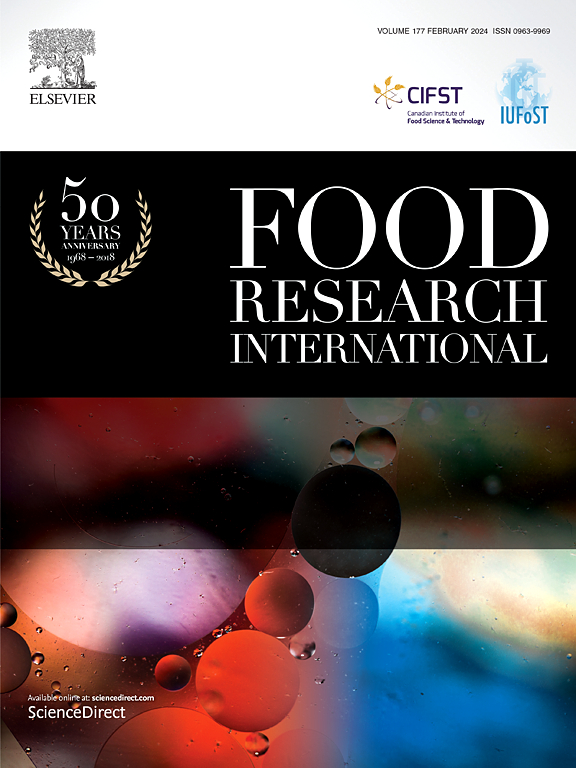回火条件对碎料中特殊变质、异味及挥发性化合物形成的影响
IF 7
1区 农林科学
Q1 FOOD SCIENCE & TECHNOLOGY
引用次数: 0
摘要
块茎干的变质,其特点是一种独特的异味,对块茎干工业提出了重大挑战,导致每年10%的产量损失。回火工艺对防止这一问题起着至关重要的作用。本研究研究了高水分回火条件下(15 - 27%水分,25、35和45°C, 0-12 h)的腐败,重点研究异味形成、挥发性化合物和微生物活性。在较高的水分含量和温度下延长回火对产品质量有显著影响(p≤0.05),引起异味、酸败和微生物腐败。挥发性化合物,包括2,3-丁二醇、戊醛、己醛、4-乙烯基愈创木酚、2-甲氧基-4-乙烯基酚,与异味有关。高湿度水平(25 - 27%)加速了微生物的生长,在变质的样品中检测到黑曲霉、铜绿假单胞菌和阪崎克罗诺杆菌。硫代巴比妥酸反应物质数据表明,脂质氧化有助于异味的形成,强调了在这些回火条件下脂质氧化和微生物腐败的作用。这些研究结果强调了控制回火参数对保持块茎质量的重要性。本文章由计算机程序翻译,如有差异,请以英文原文为准。

Impact of tempering conditions on special spoilage, off-odor and the formation of volatile compounds in bulgur
The spoilage of bulgur, characterized by a distinctive off-odor, poses a significant challenge to the bulgur industry, resulting in an annual production loss of 10 %. The tempering process plays a critical role to prevent this problem. This study investigated spoilage under high-moisture tempering conditions (15–27 % moisture, 25, 35 and 45 °C, 0–12 h), focusing on off-odor formation, volatile compounds and microbial activity. Extended tempering at elevated moisture contents and temperatures significantly (p ≤ 0.05) impacted product quality, causing off-odor, rancidity and microbial spoilage. Volatile compounds, including 2,3-butanediol, pentanal, hexanal, 4-vinyl-guaiacol, 2-methoxy-4-vinylphenol, were linked to off-odors. High moisture levels (25–27 %) accelerated microbial growth, with Aspergillus niger, Pseudomonas aeruginosa and Cronobacter sakazakii detected in deteriorated samples. Thiobarbituric-acid-reactive substances data indicated that lipid oxidation contributed to off-odor formation, highlighting the roles of lipid oxidation and microbial spoilage under these tempering conditions. These findings emphasize the importance of controlling tempering parameters to preserve bulgur quality.
求助全文
通过发布文献求助,成功后即可免费获取论文全文。
去求助
来源期刊

Food Research International
工程技术-食品科技
CiteScore
12.50
自引率
7.40%
发文量
1183
审稿时长
79 days
期刊介绍:
Food Research International serves as a rapid dissemination platform for significant and impactful research in food science, technology, engineering, and nutrition. The journal focuses on publishing novel, high-quality, and high-impact review papers, original research papers, and letters to the editors across various disciplines in the science and technology of food. Additionally, it follows a policy of publishing special issues on topical and emergent subjects in food research or related areas. Selected, peer-reviewed papers from scientific meetings, workshops, and conferences on the science, technology, and engineering of foods are also featured in special issues.
 求助内容:
求助内容: 应助结果提醒方式:
应助结果提醒方式:


